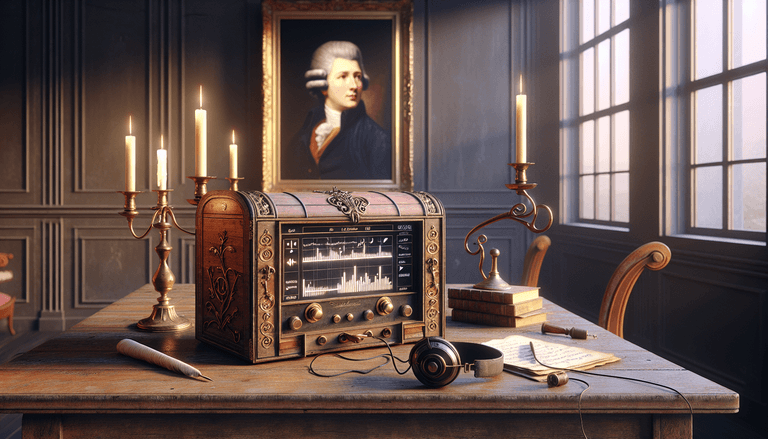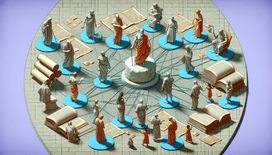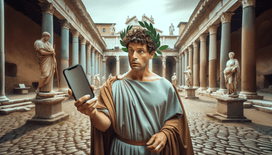Ah, Wolfgang Amadeus Mozart, the OG of classical composers! If there ever was a prodigy who moved notes with the ease of an air-guitarist in an 80s rock band, it was him. Born in 1756, young Wolfgang was a musical genius, creating symphonies at the age most of us are still figuring out how not to eat crayons. But what if Mozart had a sonic companion from the 21st century? What if he had Spotify?
Mozart Meets His Playlist
Imagine the scene: Mozart, at the ripe old age of 10, seated at his fortepiano with an air of authority usually reserved for kings and toddlers in supermarket aisles. Suddenly, in walks a futuristic artifact – a smartphone, armed with Spotify. As he taps on the screen like a curious cat, he encounters a world of music beyond his wildest symphonic dreams.
Mozart, keen on innovation, instantly proclaims, "This device is wunderbar!" He's overjoyed, blaring Bach one moment, and then having his wig blown back by some classic rock the next. Oh, how the mighty Mozart hums along to The Rolling Stones, blending baroque with "Sympathy for the Devil." Who knew a harpsichord could keep such a wicked beat?
From Forte to "Albums To Chill And Play To"
For a man who lived in the age of powdered wigs and musical patronage, Spotify's algorithmic genius would be both alarming and revolutionary. The Discover Weekly feature would offer Mozart a melange of musical styles, fuelling his creativity in ways unthinkable in 18th-century Vienna. "Hey Wolfgang, based on your taste in Türk Marches, you might like some Turkish Delight Synthpop," the algorithm might suggest.
The thought of Mozart rocking an "Albums To Chill and Play To" playlist, complete with chillstep beats and lo-fi hip-hop, is divine. It's likely he’d have thrown caution – and perhaps a stray manuscript – to the wind, letting these tunes inspire piano concertos that bewildered contemporaries with their avant-garde flair.
The Rise of Wolfgang, the Podcaster
Oh, and let us not forget podcasts! What might Wolfgang have done with this modern medium of expression? Would "Mozart's Musings" have graced the digital airwaves, offering the 18th century a taste of his life, thoughts, and music? Each episode could end with a symphonic cliffhanger, leaving listeners thirsty for a crescendo that’s only a subscription away.
Mozart could banter with fellow musicians and contemporary artists from Beethoven to Bieber, perhaps even experimenting with the concept of a collaborative album that would rival any modern-day "feat." in the music industry. Picture "Eine kleine Nachtmusik," featuring Drake! Now that's a collab we'd all clap our white powdered gloves for.
A Social Symphony Unleashed
What about social media, the cacophony of voices Mozart could have harnessed? Surely he would have had an Instagram littered with close-ups of sheet music, selfies with a baffled Salieri, and stories of musical assembly, peppered with the latest filtrations of his "Finesse Playlist." His TikToks showing off his skills at the keyboard could easily go viral, with fans initiating challenges like #MozartChallenge, where users try their hand at composing a quick symphony on GarageBand.
The online reactions to Mozart's new "drops" would be either glorious or brutal, but isn't that the very essence of music critique? Perhaps "Eine kleine Nachtmusik" becomes "Eine Grand Influencer," as even influencers rave about the vibes it brings to their latest vlogs.
The Symphony of Possibilities
Ultimately, would it change the course of musical history? Or scribe an entirely new one? With Spotify, Mozart would have seen the world of music expand beyond the concert hall's velvet veil, experiencing the cosmos from within his salon. Maybe his compositions would remain untouched in their éclat, or perhaps they’d morph into a daring synthesis of diverse global sounds, brimming with drums, synths, and even dabbles in metal.
As with any grand "what if," we can only speculate. One certainty lingers, though: with Spotify by his side, Mozart's journey would never hit a dull note. Here’s to Wolfgang, the original rhythm revolutionary. May his symphony echo through history – with or without modern aids – and inspire us to weave our "Wunderkinds" using whatever melodies play our heartstrings. Bravo, maestro!







